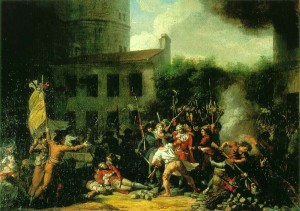On July 14, 1789, enraged by the firing of finance minister Jacques Necker, the people of Paris stormed the Bastille looking for guns and ammo and to free any political prisoners they might find. (There were actually only 7 prisoners in the Bastille at that point, but plenty of weapons and gunpowder, so it worked out in the end.)
A year later, the people of Paris hauled ass to the Champ de Mars outside the city and prepared the grounds for a grand ceremonial feast, the Fête de la Fédération. There King Louis XVI swore an oath to uphold the constitutional of France, and the centuries of absolute monarchy officially ended. The celebrants considered this the end of the revolution and a huge public feast that lasted for 4 days followed.
Since we’ve all flipped to the end of this book, we know things didn’t go quite that smoothly. It wasn’t until 1880 that France officially passed a law making July 14th the national holiday. For those who were not huge fans of the revolutionary fervor which ran so much blood through the streets, they could consider it a celebration of the Fête de la Fédération, a day which had seen French people from all walks of life united and happy.
And now, because everyone loves an Internet quiz, find out how much you know about Bastille Day as represented in literature: Bastille in Literature quiz. I got 8 out 10, but I must confess that 1 of them I only got because I just saw A Tale of Two Cities which was showing on teevee in honor of the day. (Protip: Basil Rathbone makes ruthless aristocrats look goooood.)
